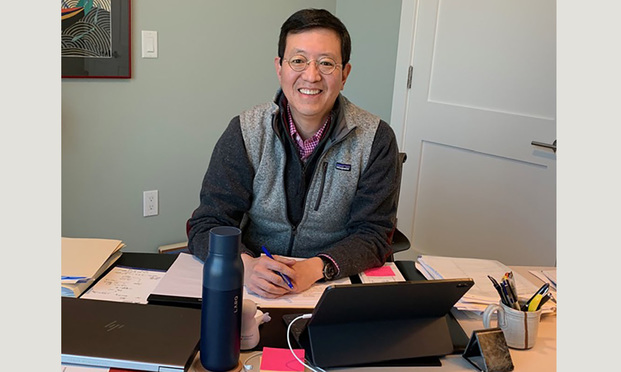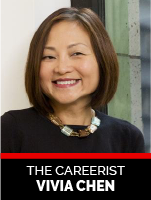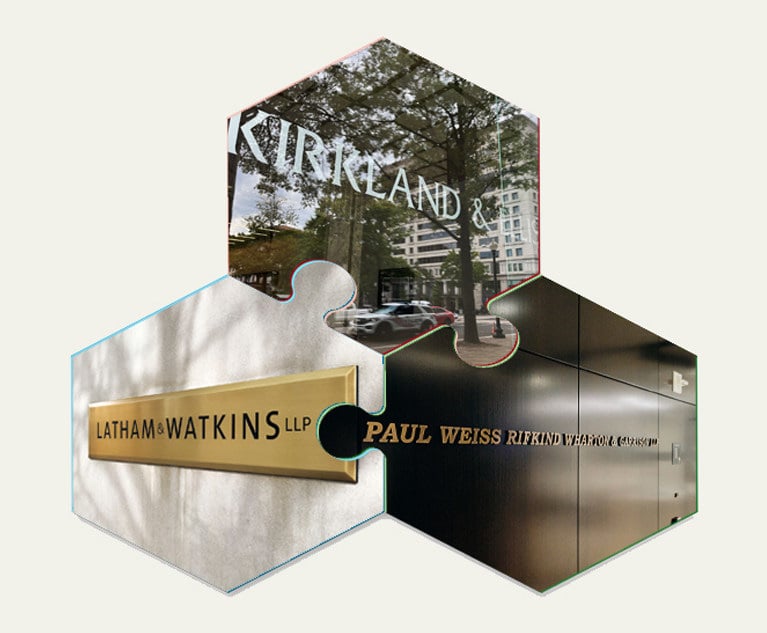3M's Ivan Fong From the COVID-19 Bunker: Trump's Tweet, Masks and Bundt Cake
The former GC of Homeland Security under President Barack Obama, Fong is well-versed in the art of crisis. Still, the pandemic presents its own brand of challenges.
April 16, 2020 at 12:34 PM
8 minute read
 Ivan Fong (courtesy photo).
Ivan Fong (courtesy photo).
This is the second installment of my series "From the COVID-19 Bunker" on how legal luminaries are dealing with the pandemic.
 This is one top job that you probably don't want right now: Being the legal chieftain of 3M, the maker of the scarce N95 respirator masks. Not only has the company been under enormous pressure to step up production of the critical N95, but President Donald Trump lambasted 3M in a tweet, suggesting that it was failing the country during the COVID-19 crisis. (On April 2, Trump tweeted: "We hit 3M hard today after seeing what they were doing with their Masks … Big surprise to many in government as to what they were doing—will have a big price to pay!" )
This is one top job that you probably don't want right now: Being the legal chieftain of 3M, the maker of the scarce N95 respirator masks. Not only has the company been under enormous pressure to step up production of the critical N95, but President Donald Trump lambasted 3M in a tweet, suggesting that it was failing the country during the COVID-19 crisis. (On April 2, Trump tweeted: "We hit 3M hard today after seeing what they were doing with their Masks … Big surprise to many in government as to what they were doing—will have a big price to pay!" )
Ivan Fong—3M's general counsel, senior vice president and secretary—helped steer the company through that recent storm, negotiating with the Trump administration to reach an agreement on production of the N95s. (Four days after the initial tweet, Trump changed his tune, suggesting that his scolding whipped 3M into shape: "We're very proud now to be dealing with 3M.")
The former GC of Homeland Security under President Barack Obama, Fong is well-versed in the art of crisis. He was at the helm during the "Shoe Bomber" and the "Underwear Bomber" threats, as well as the colossal Deepwater Horizon oil spill.
Yet, Fong admits this current crisis is unique. Below is an edited version of several phone conversations and emails over the course of a week.
Where are you? I'm at my home with my wife. We live in a condo [in Minneapolis area]. My kids are well—one is on the East coast, one on the West coast and one nearby.
I assume you're up to your eyeballs on COVID-19 matters. It's all coronavirus—day and night. We're working on ramping up production of respirators, dealing with the supply chain, government affairs. I'm fielding calls from hospitals, state governments, friends who work in government. It's super nonstop.
The question I'm sure everyone wants to know: Do you wear an N95 when you go outside? I wear a neck gaiter. I got it from a 10K race I did a while ago. I find it more comfortable than an N95 respirator, which my wife donated to a local hospital last week. There's a difference between a mask and a respirator: A mask prevents your droplets from reaching others, but it won't protect you. A respirator filters out particles and keeps you from inhaling them into your body. The N95 is actually a respirator.
Let's turn to another topic people are curious about: Trump's tweet about 3M. What was it like to manage the public pressure 3M was under from the White House in recent weeks? I'm pleased that on April 6, 3M and the Trump Administration were able to announce a plan to import 166.5 million respirators over the next three months to support health care workers in the United States. 3M and the Administration worked together to ensure that this plan does not create further humanitarian implications for countries currently fighting the COVID-19 outbreak. We're also collaborating to fight price gouging and counterfeiting.
And what about the administration's claim that 3M only stepped up because Trump invoked the Defense Production Act? As 3M's CEO Mike Roman said recently, "Nothing is further from the truth." Beginning in January, 3M ramped up production of N95 respirators and doubled its global output to 1.1 billion per year, including 35 million a month in the United States. 3M has already put into motion additional investments and actions that will enable it to double its capacity again to 2 billion globally within 12 months, with additional capacity to begin coming online in the next 60 to 90 days. In the U.S., for example, 3M expects to be producing N95 respirators at a rate of 50 million per month in June, a 40% increase from current levels.
You're used to dealing with unexpected disasters. So how does crisis compare with your time as GC of Homeland Security? Is there anything analogous? I'd say the Gulf of Mexico Deepwater Horizon oil spill is closest. That was two to three weeks of nonstop work. It was dealing with the ongoing discharge of oil, the impact on the surrounding economies, coordinating with different government departments—all while c-span had its cameras on the oil rig the entire time.
Two or three weeks of intensity sounds like a picnic compared to this pandemic. This is a global, rolling crisis. The uncertainty and stress over what will happen next make it very different. I'm also concerned about the impact it will have on different social classes and how it exacerbate class disparities and income inequality. We are already seeing that effect on kids who are disadvantaged.
Is this pandemic changing your outlook on management and lawyering? This pandemic can't help but change the way we work. We're only starting to appreciate the risks. There's the immediate situation—our need to work remotely and the challenges that it poses for people who have to take care of kids or elderly parents. The plus side is that it's prompted people to be much more comfortable with technology, and there's increased receptivity to flexibility. But there's also decreased visibility with clients, and we miss out on critical relationship building. Those unstructured conversations are so important.
I'm also concerned about mental health. The anxiety is extremely high right now, and lawyers already have high levels of stress. 3M has been a leader in mental health, and I want to make sure the legal department is getting enough sleep, exercise and pacing themselves. We can do what we can. I'm afraid we will see higher levels of anxiety and substance abuse.
And what will happen with issues like diversity and inclusion in the profession? Will D&I get pushed aside like it did during the last recession? I've told my department not to lose focus on our work on diversity/inclusion. We're all working from home, so our D&I meetings are now virtual.
You're pushing for D&I at 3M, but what about law firms and the corporate world at large? Don't you think D&I issues will take a big hit in this climate when businesses are just trying to survive? It's reasonable to assume that given the global pandemic crisis, law firms and corporations might lose focus and not prioritize D&I as they had previously. But It's now more important than ever to view inclusion through the broader lens of mental health and well-being. I'm concerned that profession will see increased levels of mental health issues long term if people feel excluded.
What do you think about the racism Asian Americans are now facing during this pandemic? [The FBI expects a surge of coronavirus-related hate crimes against Asian Americans.] I've heard about racial incidents from Asian Americans in Minnesota and elsewhere. They are reminders of the way we're viewed as a community and how we're judged. It raises the question what does it mean to be fully American. Andrew Yang said he gets looks—anti-Asian looks. You have to wonder if Asian Americans will feel they fully belong as Americans when so much attention is on how this coronavirus is described.
Racism, mental health, losing the human touch: not exactly happy talk. Any silver lining to what we've going through? Faster adoption of videoconferencing technology—we did our first virtual board meeting this week; our legal department launched an e-signature capability in record time; and our global legal department is now hosting weekly virtual coffee hours.
Virtual coffees, not virtual cocktails? OK. How's that going? We have virtual coffee hours where people can just drop in. It's had a hugely positive reaction. We have lawyers all over the world—in China, Italy, the UK, Spain—and just seeing each other mitigates stress.
Are you dropping in too? Yes, but I'm careful not to chill the conversation. First one I did was at 6 a.m. with people in Asia and Europe. I even took a shower to participate.
Are you cooking up a storm like a lot of folks during this pandemic? I'm not a very good cook, but I'm trying to bake—bundt cakes. A while ago, I saw a New York Times recipe for a 7-Up bundt cake, and I thought I could do that. I'm into having the right equipment—the right pan, the right cooling rack. The bundt pan was actually invented in Minnesota. My goal is to create a signature cake, so I'm experimenting. I'd like to make the perfect bundt cake.
Contact Vivia Chen at [email protected]. On Twitter: @lawcareerist
This content has been archived. It is available through our partners, LexisNexis® and Bloomberg Law.
To view this content, please continue to their sites.
Not a Lexis Subscriber?
Subscribe Now
Not a Bloomberg Law Subscriber?
Subscribe Now
NOT FOR REPRINT
© 2025 ALM Global, LLC, All Rights Reserved. Request academic re-use from www.copyright.com. All other uses, submit a request to [email protected]. For more information visit Asset & Logo Licensing.
You Might Like
View All

Change Is Coming With the New Trump Era. For Big Law, Change Is Already Here
6 minute read

Trending Stories
- 1Midlevel Appellate Court Reinstates New York's Voting Rights Act
- 2Consumer Protection Suit Cleared to Go Forward Against Irritating Eye Serum
- 3COVID-19 Was Still Relevant in Securities Class Actions During 2024, Report Says
- 4After Botched Landing of United Airlines Boeing 767, Unlikely Plaintiff Sues Carrier
- 5DOT Moves to Roll Back Emissions Rules, Eliminate DEI Programs
Who Got The Work
J. Brugh Lower of Gibbons has entered an appearance for industrial equipment supplier Devco Corporation in a pending trademark infringement lawsuit. The suit, accusing the defendant of selling knock-off Graco products, was filed Dec. 18 in New Jersey District Court by Rivkin Radler on behalf of Graco Inc. and Graco Minnesota. The case, assigned to U.S. District Judge Zahid N. Quraishi, is 3:24-cv-11294, Graco Inc. et al v. Devco Corporation.
Who Got The Work
Rebecca Maller-Stein and Kent A. Yalowitz of Arnold & Porter Kaye Scholer have entered their appearances for Hanaco Venture Capital and its executives, Lior Prosor and David Frankel, in a pending securities lawsuit. The action, filed on Dec. 24 in New York Southern District Court by Zell, Aron & Co. on behalf of Goldeneye Advisors, accuses the defendants of negligently and fraudulently managing the plaintiff's $1 million investment. The case, assigned to U.S. District Judge Vernon S. Broderick, is 1:24-cv-09918, Goldeneye Advisors, LLC v. Hanaco Venture Capital, Ltd. et al.
Who Got The Work
Attorneys from A&O Shearman has stepped in as defense counsel for Toronto-Dominion Bank and other defendants in a pending securities class action. The suit, filed Dec. 11 in New York Southern District Court by Bleichmar Fonti & Auld, accuses the defendants of concealing the bank's 'pervasive' deficiencies in regards to its compliance with the Bank Secrecy Act and the quality of its anti-money laundering controls. The case, assigned to U.S. District Judge Arun Subramanian, is 1:24-cv-09445, Gonzalez v. The Toronto-Dominion Bank et al.
Who Got The Work
Crown Castle International, a Pennsylvania company providing shared communications infrastructure, has turned to Luke D. Wolf of Gordon Rees Scully Mansukhani to fend off a pending breach-of-contract lawsuit. The court action, filed Nov. 25 in Michigan Eastern District Court by Hooper Hathaway PC on behalf of The Town Residences LLC, accuses Crown Castle of failing to transfer approximately $30,000 in utility payments from T-Mobile in breach of a roof-top lease and assignment agreement. The case, assigned to U.S. District Judge Susan K. Declercq, is 2:24-cv-13131, The Town Residences LLC v. T-Mobile US, Inc. et al.
Who Got The Work
Wilfred P. Coronato and Daniel M. Schwartz of McCarter & English have stepped in as defense counsel to Electrolux Home Products Inc. in a pending product liability lawsuit. The court action, filed Nov. 26 in New York Eastern District Court by Poulos Lopiccolo PC and Nagel Rice LLP on behalf of David Stern, alleges that the defendant's refrigerators’ drawers and shelving repeatedly break and fall apart within months after purchase. The case, assigned to U.S. District Judge Joan M. Azrack, is 2:24-cv-08204, Stern v. Electrolux Home Products, Inc.
Featured Firms
Law Offices of Gary Martin Hays & Associates, P.C.
(470) 294-1674
Law Offices of Mark E. Salomone
(857) 444-6468
Smith & Hassler
(713) 739-1250










